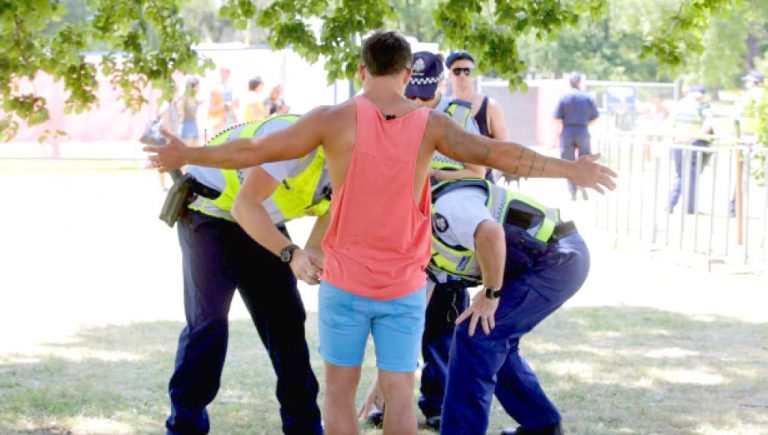Image via
If you attend music festivals regularly (or used to in the Before Times), you’ve likely witnessed someone get hassled for drugs. Getting coerced by a plainclothes officer and quickly surrounded by a group of cops salivating for evidence as they search your pockets and through your bag will ruin any weekend — and possibly your life. The threat of these policing tactics alone may cause harm to attendees, according to researchers from the University of New South Wales (UNSW).
Published in the journal Drug and Alcohol Review, researchers from UNSW’s St. Vincent’s Clinical School surveyed 1,229 attendees from six major music festivals in New South Wales between November 2019 and March 2020. In an anonymous survey, participants answered questions about their drug use (MDMA was the leading drug of preference, according to the study) and higher-risk behaviors, such as: Consuming all the drugs in one’s possession before entering a festival (this is called “preloading”); consuming two or more doses of MDMA at once; higher-risk alcohol use consisting of drinking 11 or more adult beverages alongside drug use, and mixing stimulants.
Of the 1,229 participants, 372 (or 30 percent) intended to use drugs or said they had already consumed a substance that day. MDMA was the most commonly reported drug of use, with 77 percent planning to or had already ingested it that weekend. Cocaine, cannabis, LSD, and ketamine were also among the frequently reported drugs used in the survey.
Of the 286 people using MDMA, 48 percent reported double-dropping. Gender differences were significant, with men more than twice as likely to double-drop than women. 82 participants (22 percent) responded “yes” to using drugs and also high-risk alcohol intake.
Attendees also reported that the mere presence of police and drug-sniffing K9s at an event influenced their decisions to do drugs. People who reported fear of drug policing at festivals were more than twice as likely to preload to avoid any altercations with security or cops. Researchers surmise that this impulse points to a significant correlation between fear of arrest and panic consumption, which can lead to overdoses and other physical and mental challenges.
“This study heightens existing concerns regarding unintended harmful consequences of the policing of drug use at festivals,” the study found.
“There’s a growing body of evidence now in Australia that [shows] police and police dog presence and security strategies at festivals are actually potentially really harmful,” said Dr. Jonathan Brett, co-author of the study and senior research fellow at the University of NSW.
In 2019, the NSW deputy coroner found that high-visibility policing tactics, such as drug dogs and strip-searching at music festivals, increased drug risks. Researchers hope the climate of policing at music festivals changes ASAP to mitigate the risk of “panic overdoses” in the future.
“I really hope we can have a conversation, not about removing police altogether but potentially about a different approach to policing strategies that isn’t just about criminalizing drug users,” said Dr. Brett, per The Guardian. “Everyone wants people to be safer and healthier, so we need to discuss how we can best achieve that.”











